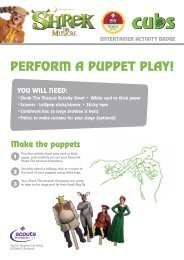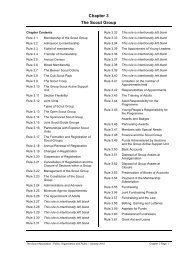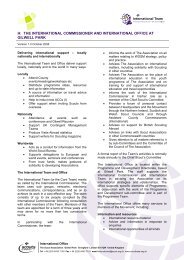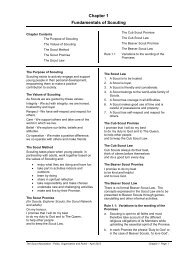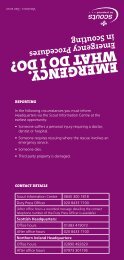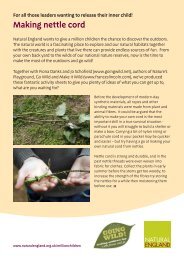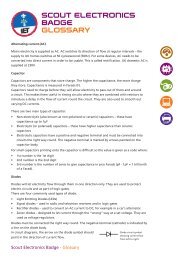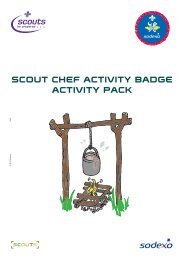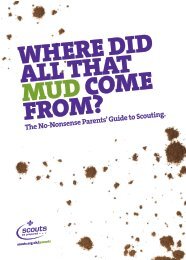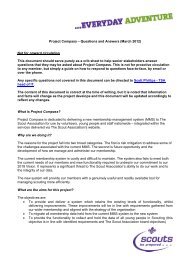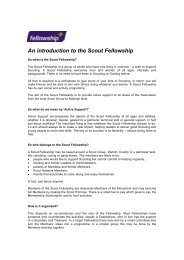valuing diversity - The Scout Association
valuing diversity - The Scout Association
valuing diversity - The Scout Association
- No tags were found...
Create successful ePaper yourself
Turn your PDF publications into a flip-book with our unique Google optimized e-Paper software.
<strong>valuing</strong> <strong>diversity</strong>making <strong>Scout</strong>ing available to all 0707 | <strong>valuing</strong> <strong>diversity</strong>
07Who is Valuing Diversity for?This module (number 7) is for all adults who hold warranted Appointmentsin <strong>Scout</strong>ing. It provides them with basic information about equalopportunities. It also includes practical help for creating a programmethat is suitable for all.What does this module contain?This module contains almost 4 1 / 2 hours of learning that may be managedin a variety of ways.How is this module validated?<strong>The</strong> validation of this module is based on the individual’s ability to meetthe validation criteria, as set out in the Training Adviser’s Guide and theAdult’s Personal File. This means that the adult will be required todemonstrate their understanding of <strong>The</strong> <strong>Scout</strong> <strong>Association</strong>’s EqualOpportunities, Co-education and Religious Policies, as well as theirability to incorporate them into their everyday <strong>Scout</strong>ing.What information is provided?Subjects covered include diverse communities, the diverse nature ofindividuals, facts and policy, and the practical application of the policies.<strong>The</strong> objectives for the module are given followed by training methods. <strong>The</strong>content is given in outline with the key points expanded in more detail.Trainer’s notes are also given to provide guidance on delivering the sessions.<strong>The</strong> information is not however a script for the session. Prior knowledgeand/or research of the subject matter by the Trainer will be required beforedelivery of the training.Series EditorChris JamesEditorsRobert HalkyardClaire McAuliffeContributorsHelen ApseyTian BerseyDebbie LaddsJackie MartinPaul WilkinsonDesign andProduction<strong>The</strong> WorkroomCopyright © 2003<strong>The</strong> <strong>Scout</strong> <strong>Association</strong>New EditionFirst printed 2003Printed by Belmont PressEditor’s noteAlthough in some parts of the British Isles <strong>Scout</strong> Counties are known as Areas or Islands and inone case Bailiwick, for ease of reading this material simply refers to County or Counties.
Session details<strong>The</strong> following sessions are included in this module:Session Page Timing (hrs)1 A diverse community 4 0:352 Individuals 7 0:503 Facts and policy 10 1:304 Practical application 14 0:505 Action plans 17 0:25Depending on the number and nature of the participants and staff,these sessions may need to be preceded by introduction and/orintegration sessions.Planning considerationsModule 7, Valuing Diversity is a compulsory module for all adults workingtowards a Wood Badge. <strong>The</strong> learners for this module will have various rolesand levels of experience within <strong>Scout</strong>ing as they will either be an adult newto <strong>Scout</strong>ing or changing roles.Some work may need to be done before delivering the sessions as thepresenter needs to be confident in discussing the policies relating to EqualOpportunities, Co-education, Minority Groups and Special Needs. <strong>The</strong>y willalso need to value <strong>diversity</strong> in <strong>Scout</strong>ing and have an understanding,preferably with practical experience, of how to implement the policies.Much of this session is based around challenging the way people think,and encouraging them to change their behaviour. Sensitivity will thereforebe essential in dealing with these subjects. In order that participants makethe most of this module, they must be made aware that they are in a safeenvironment where views can be explored openly.<strong>The</strong> number of participants on the course will determine your ways ofworking. Smaller numbers allow for one to one or individual workingand sharing ideas. It is recommended that large groups (of eight or moreparticipants) are broken into tutor groups, each supported by a tutor.Facilitator’s notes are provided on the reverse of the each handout.Valuing <strong>diversity</strong> 1
TrainerValuing <strong>diversity</strong>LearnerGroupAimTo promote the policies of <strong>The</strong> <strong>Scout</strong> <strong>Association</strong> that encourage <strong>diversity</strong>and to consider how individuals, in their roles, can help make <strong>Scout</strong>ingavailable to all.Objectives<strong>The</strong>re are 12 overall objectives for this module:Report backVisual aidsTrainer’s notesHandout notes123456789101112State <strong>The</strong> <strong>Scout</strong> <strong>Association</strong>’s policy regarding Co-education,Equal Opportunities, Minority Groups and Special Needs.Explain and value <strong>The</strong> <strong>Scout</strong> <strong>Association</strong>’s Co-education Policy.Explain the steps necessary for a <strong>Scout</strong> Group to be open to both sexes.Identify how co-education can be built into the Programme.Accept the importance of <strong>The</strong> <strong>Scout</strong> <strong>Association</strong>’s Equal OpportunitiesPolicy.Demonstrate a commitment to the implementation of <strong>The</strong> <strong>Scout</strong><strong>Association</strong>’s Equal Opportunities Policy.Identify the wide range of Special Needs.Accept that <strong>Scout</strong>ing is available to all young people regardlessof their needs.Locate where information, advice and support is available to supportSpecial Needs.Value cultural, social and religious <strong>diversity</strong> within communities.Explain how <strong>Scout</strong>ing can meet the needs of diverse communities.Explore the contribution <strong>Scout</strong>ing can make locally in furthering thedevelopment of a more inclusive society.Timing2Valuing <strong>diversity</strong>
MethodsA series of sessionsThis module may be delivered as a series of training sessions in avariety of time settings. It is recommended however, that they shouldbe delivered together, as each session builds on the tasks completedin the previous session.WorksheetSmall group trainingThis module could be delivered as a series of small group discussions.Where tasks involve groups discussing different topics, either choosethe task most appropriate to the group, or ask the group to split intotwos or threes to complete the tasks.One to one trainingThis module could be delivered on a one to one basis by a Trainer, orsomeone with sufficient experience to coach a candidate through thesubject areas. As this session deals with personal views and attitudes,it is important that the coach is someone with whom the participantfeels comfortable. <strong>The</strong> coach must also be confident in their ability toanswer complex questions on the subject.ResourcesTo carry out the training in its entirety you will need the following:• Flipchart• Flipchart paper and pens• OHP and OHTs• Pin board and pins• A4 paper or card• Newspaper articles from local and regional newspapers about thecultural, social and religious <strong>diversity</strong> within the District or County/Area.• Copies of relevant handouts• Copies of relevant worksheets• Copies of Valuing Diversity.Resources are summarised at the start of each set of Trainer’s notes foreach session.Valuing <strong>diversity</strong> 3
Valuing <strong>diversity</strong>: session 1A diverse communityKey objectives1 Value cultural, social and religious <strong>diversity</strong> within communities.2 Explore the contribution <strong>Scout</strong>ing can make locally in furthering thedevelopment of a more inclusive society.ResourcesFor this session, you will need the following resources:• Flipchart• Flipchart paper and pens• OHP and OHTs.Trainer inputExplain the definition of a diverse organisation from <strong>The</strong> National Centre forVolunteering using OHT 1 . <strong>The</strong> definition is given as follows:‘A diverse organisation is one which values difference. It is one whichrecognises that people with different backgrounds, skills, attitudes andexperiences bring fresh ideas and perceptions. Diverse organisationsencourage and harness these differences to make their services relevantand approachable. A diverse organisation draws upon the widest possiblerange of views and experiences, so it can listen to, and meet the changingneeds of its users, staff, volunteers, partners and supporters’.Explain that we show that we value something by:• recognising its worth• knowing the importance of understanding• recognising the need to respect differences.To value <strong>diversity</strong> in <strong>Scout</strong>ing, we need to respect and value the <strong>diversity</strong> ofthe communities in which we operate. We respect and value the individualdifferences that each person brings to <strong>Scout</strong>ing. We try to maximise thepotential of the young people and adults in <strong>Scout</strong>ing by developing andencouraging the best use of their wide variety of skills and attributes.We will start by looking at the diverse nature of the communities in whichwe live.4Valuing <strong>diversity</strong>
TaskIn small groups, discuss the following:• In what ways are the communities in which we live diverse?• What positive value can this <strong>diversity</strong> bring to a community?Report backAsk each group to share five of their ideas for each of the two questions.Possible answers for the first question include:• rural/urban• multi-ethnic• multi-cultural• social backgrounds• norms of behaviour• demographics – age, gender• income• expectations for the future• education• understanding of what <strong>Scout</strong>ing has to offer.Possible answers for the second question include:• tolerance• raising awareness of other cultures and faiths• understanding of other races, religions, and cultural practices• acceptance of people as just people• confronting ignorance.Trainer inputExplain that the Purpose of <strong>Scout</strong>ing is to promote the development ofyoung people in achieving their full physical, intellectual, social and spiritualpotential as individuals, as responsible citizens and as members of theirlocal, national and international communities. It is important to recognisethat <strong>Scout</strong>ing differs across the UK, and across the world.In order to attract young people, and to give them the opportunity todevelop, we should offer them the <strong>Scout</strong>ing that they want, that meetstheir needs.Valuing <strong>diversity</strong> 5
In the next session we will go on to look at the diverse nature of individualsand how local Leaders and Commissioners can adapt their <strong>Scout</strong>ing tomeet the needs of young people in their communities.In particular, the session will cover the Equal Opportunities Policy, SpecialNeeds, Minority Groups, and Co-education.We will explore the impact that these have on everyday activities in<strong>Scout</strong>ing, such as meetings, programme planning, recruitment of Leaders,camps and so on.6Valuing <strong>diversity</strong>
Valuing <strong>diversity</strong>: session 2IndividualsKey objectives1 State <strong>The</strong> <strong>Scout</strong> <strong>Association</strong>’s policy regarding Co-education, EqualOpportunities, Minority Groups and Special Needs.2 Accept the importance of <strong>The</strong> <strong>Scout</strong> <strong>Association</strong>’s Equal OpportunitiesPolicy.ResourcesFor this session, you will need the following resources:• Flipchart• Flipchart paper and pens• OHP and OHTs• Pin board and pins• Copies of Worksheet 1, Getting to Know Someone.Trainer inputWe need to remember a fundamental truth – that we are all individualswith individual needs. <strong>Scout</strong>ing tries to meet those needs.Explain that although we have an Equal Opportunities Policy, <strong>Scout</strong>ing isnot open to an individual without question. Sometimes there are legitimategrounds for exclusion within the <strong>Scout</strong>ing framework (for example, if anadult is an atheist).Outline the six key areas of the Equal Opportunities Policy using OHT 2 :• Class• Ethnic origin, nationality (or statelessness) or race• Gender• Marital or sexual status• Mental or physical ability• Political or religious belief.Explain how the policy differs when applied to young people and adults.Valuing <strong>diversity</strong> 7
For young people:• We are committed to extending <strong>Scout</strong>ing, its Purpose and Method toyoung people in all parts of society.• No young person should receive less favourable treatment nor sufferdisadvantage because of any of the six areas above.For adults:• <strong>The</strong> <strong>Scout</strong> <strong>Association</strong>’s values, which underpin and inspire our workwith young people, are embodied within the Purpose of <strong>The</strong> <strong>Scout</strong><strong>Association</strong> and in the <strong>Scout</strong> Promise and Law.• To carry out its work, adult Leaders and Supporters are needed who areprepared to accept the responsibilities of their commitment.• Members must be ‘fit and proper’ persons to undertake duties ofappointed positions and where appropriate, the responsibilities ofMembership.• <strong>The</strong>y need to ensure:• the safety and security of young people• the continued development of young people• equal opportunities for all.Explain that this is a Policy of <strong>The</strong> <strong>Scout</strong> <strong>Association</strong>, as agreed by theCommittee of the Council in 1997. When we take on a role in <strong>Scout</strong>ing weagree to abide by this Policy.TaskIn pairs, and without speaking, complete Worksheet 1. Once it is complete,discuss whether your assumptions about each other were correct.Trainer’s notesFor the next task there are two options. It is advisable to divide theparticipants into two groups, with each group completing a differentoption. If there are too many participants to work effectively in two groups,then split them up into tutor groups and ask different groups to completedifferent options.TaskIn groups, discuss one of the following options:8Valuing <strong>diversity</strong>
Option oneWe are all prone to making assumptions about other people. Whenrecruiting adults, what assumptions might we tend to make about them inthe following areas: ability, finance, time availability, culture, age, existingskills, family situation, gender, beliefs and values?Option twoWe are all prone to making assumptions about other people. Whenplanning a programme, what assumptions might we tend to make aboutyoung people in the following areas: ability, finances, parental backgroundand support, gender, other hobbies, culture – (e.g. food, clothing, socialnorms, religion) and at camp?Report backAsk each group to share the list of assumptions that they came up with.Ensure that any similarities and differences in the lists are highlighted.Trainer inputExplain that everyone makes assumptions about people and situations.Instinctively we judge on the information we have available to us.What influences our assumptions?• <strong>The</strong> media• Family• School/college• Peers• <strong>Scout</strong>ing• Work• Our own experiences• Hearsay and gossip.We need to base our judgements on fact and not opinion, myth orstereotypes.As <strong>Scout</strong>s and responsible members of society we need to value everyMember as an individual, value what they have to offer <strong>Scout</strong>ing andrecognise the benefit they bring to others who work with them in <strong>Scout</strong>ing.As Leaders in <strong>Scout</strong>ing, we should remember that we are one of theinfluences on young people and the assumptions they might make,as well as the other adults with whom we work.Valuing <strong>diversity</strong> 9
Valuing <strong>diversity</strong>: session 3Facts and policyKey objectives1 State <strong>The</strong> <strong>Scout</strong> <strong>Association</strong>’s policy regarding Co-education, EqualOpportunities, Minority Groups and Special Needs.2 Explain and value <strong>The</strong> <strong>Scout</strong> <strong>Association</strong>’s Co-education Policy.3 Explain the steps necessary for a <strong>Scout</strong> Group to be open to both sexes.4 Identify the wide range of Special Needs.5 Accept that <strong>Scout</strong>ing is open to all young people regardless of theirneeds.6 Locate where information, advice and support is available to supportSpecial Needs.7 Value the cultural, social and religious <strong>diversity</strong> within communities.ResourcesFor this session, you will need the following resources:• Flipchart• Flipchart paper and pens• A4 paper or card• Copies of Handout A, Equal Opportunities (HO A)• Copies of Handout B, Cultural, Social and Religious Diversity (HO B)• Newspaper articles from local and regional newspapers about thecultural, social and religious <strong>diversity</strong> within the District or County.• Copies of Valuing Diversity.Trainer inputRemind participants of the six key areas of the Equal Opportunities Policy,covered in the earlier session. Explain that they are now going tohave an opportunity to explore the Policy in greater depth.10Valuing <strong>diversity</strong>
TaskIn small groups, discuss possible barriers to implementing the EqualOpportunities Policy, and ways to overcome them. Use Handout A.Trainer’s notesIt may be useful to divide the participants into role specific groups i.e.groups of Commissioners, Section Leaders etc.Special NeedsTrainer inputIntroduce the session with the following points:• Most Leaders will at some time be approached by, or have a youngperson within their Section, Group or District who has a Special Need.• All of us during the course of our lives experience an impairment ofsome kind, either permanent or temporary, as a result of an illness,accident or medical condition.• <strong>The</strong>re is therefore a wide spectrum of Special Needs.Ask for some examples of Special Needs and list them up on a flipchart.Trainer inputExplain that there are a number of different categories of Special Needs.Trainer’s notesIt may be useful to have each of the headings written on pieces of card topin up.Explain what the heading means and reflect on the effect this type ofdisability has on a person’s life.• Physical impairmentThis term describes difficulty in moving or using all or part of the body.• Sensory impairmentThis indicates that there is a loss of hearing or sight.• Learning disabilityThis suggests that a person has difficulty learning in the commonly usedand accepted way, or at the same pace as their peers. It does not meanthat they cannot learn. Often different approaches to learning will helppeople with a learning disability to understand a concept.Valuing <strong>diversity</strong> 11
• Communication difficultiesOur main forms of communication are by using speech, gesture and thewritten word. Special Needs may be present as a result of theimpairment of one or more of these communication skills.• Mental illnessThis includes illnesses that result in disorders of mood, perception,motivation etc, and also conditions that affect the actual brain tissuegiving rise to memory loss or disorientation.• Hidden disability<strong>The</strong>re are a number of conditions that affect the human body which donot produce any outward signs of impairment. Conditions such as heartdisease, respiratory disorders and epilepsy may affect the person’s abilityto function effectively in particular situations or at certain times.Explain that Special Needs can either be visible or invisible. None shouldbe considered in isolation, as some Special Needs will fall into more thanone category.How does this affect <strong>Scout</strong>ing?<strong>Scout</strong>ing promotes the integration of young people with Special Needs by:• recognising those with Special Needs• accepting them• providing for them through mainstream <strong>Scout</strong>ing and Special Groups• physically integrating them• <strong>valuing</strong> them.<strong>The</strong> District Commissioner is responsible for the provision of access to<strong>Scout</strong>ing for a person with Special Needs. On occasion, it may not bepossible, appropriate, or in the best interests of the young person to join aparticular <strong>Scout</strong> Group. If this decision is taken it must be referred to theDistrict Commissioner.Explain that further information on a specific Special Need is availablethrough the following resources:• ADC or Adviser (Special Needs) or District Commissioner• ACC (Special Needs)• <strong>The</strong> <strong>Scout</strong> Information Centre• Factsheets and <strong>Scout</strong> <strong>Association</strong> resources• www.scoutbase.org.uk• Specialised websites for specific disorders or disabilities(for example www.cafamily.org.uk )• Specialised resources for specific disorders or disabilities(for example, Contact a Family Directory).12Valuing <strong>diversity</strong>
Co-education PolicyTaskIn small groups, using the resources available, create a prompt card thatexplains the following:• <strong>The</strong> key points of the Co-education Policy• <strong>The</strong> steps that need to be taken to open a Group to boys and girls.<strong>The</strong> card, to be used by Section Leaders and Group <strong>Scout</strong> Leaders, shouldbe produced on one side only of A4. It could be hand-written or created ona computer.TaskIn small groups, read the articles about people in your local community.Using Handout B, discuss how <strong>Scout</strong>ing meets the needs of young peoplewho live there.Trainer’s notesThis task requires articles from local newspapers, that will need to becollated and copied for the groups. <strong>The</strong> articles should show the cultural,social and religious <strong>diversity</strong> within their <strong>Scout</strong> District or County.Please note that there should be a variety of newspaper reports focusing ona variety of local issues. <strong>The</strong>y should not be all negative stories. <strong>The</strong> aim ofthis task is to recognise that <strong>diversity</strong> is a reality within your community andnot to present a negative image of that <strong>diversity</strong>.Valuing <strong>diversity</strong> 13
Valuing <strong>diversity</strong>: session 4Practical applicationKey objectives1 Identify how co-education can be built into the Programme.2 Demonstrate a commitment to the implementation of <strong>The</strong> <strong>Scout</strong><strong>Association</strong>’s Equal Opportunities Policy.3 Explain how <strong>Scout</strong>ing can meet the needs of diverse communities.ResourcesFor this session, you will need the following resources:• Flipchart• Flipchart paper and pens• Copies of Handouts C to I.Trainer inputExplain how <strong>The</strong> Equal Opportunities Policy underlines <strong>The</strong> <strong>Scout</strong><strong>Association</strong>’s commitment to <strong>valuing</strong> <strong>diversity</strong>. This is done by extending<strong>Scout</strong>ing to young people in all parts of society.This session is about overcoming the difficulties that can arise when puttingthe Policy into practice. <strong>The</strong> following are some tips that will help avoidmisunderstanding and fear by obtaining as much information as possible.<strong>The</strong>re are numerous resources available, such as:(In <strong>Scout</strong>ing)• District and County support• <strong>The</strong> <strong>Scout</strong> Information Centre• www.scoutbase.org.uk(Outside <strong>Scout</strong>ing)• Websites• Other organisations.14Valuing <strong>diversity</strong>
• Discuss an individual’s needs with them and/or their parents.• An individual joins not only a Section but also a Group, District andCounty. Discuss this with all the Leaders in the Group/District.• Take care when planning your programme. It is often good to haveexperiential activities including those that help young people to find outmore about <strong>diversity</strong>, for example inviting guests, visits, awarenessraising activities etc. Be aware that you may need to adapt your methodsof delivery in order to show respect to other cultures e.g. visiting aMuslim Mosque. A mixed <strong>Scout</strong> Group would need to enter in separategroups of males and females.• Make sure that you have suitable and adequate facilities for everymember of your group. Remember this not just at your meeting placebut also on camp, and whilst doing outside activities, etc.• In the recruitment and induction of adults, plan an inclusive andsupportive programme.• Remember to balance the needs of all Members.• Think creatively and ‘out of the box.’ Just because it has always beendone like that doesn’t mean that you cannot try a different way – beflexible.• Remember that <strong>valuing</strong> <strong>diversity</strong> is not just about what <strong>Scout</strong>ing hasto offer individuals. It is also about how <strong>Scout</strong>ing can benefit fromtheir participation.• Always use common sense!Trainer’s notes<strong>The</strong> next task uses a selection of the case studies provided on Handouts Cto I. <strong>The</strong> case studies you choose should depend on the roles of theparticipants and the time you have available. This session can be expandedto give the participants the opportunity to explore the practical implicationsof <strong>valuing</strong> <strong>diversity</strong> more fully.You may choose to ask participants to discuss different case studies in eachtutor group, and then ask them to share their findings with the rest of thecourse. <strong>The</strong> topic for discussion is given on the front of the handouts; notesfor facilitators are given on the reverse.It is essential that the Trainer handles the session sensitively. Discussion ofthese areas can often have a positive effect and give individuals theopportunity to explore their thoughts and feelings. Conversely the Trainershould be prepared for the possibility that the session will produceignorant, negative or resentful attitudes, challenging comments andquestions. In some respects the Trainer is in the position of reflecting thepolicy of <strong>The</strong> <strong>Scout</strong> <strong>Association</strong> and should be knowledgeable and securein dealing with difficult situations, should they arise.Valuing <strong>diversity</strong> 15
TaskIn small groups, discuss the case study given on the handout. Be preparedto give a short summary of your discussion.Report backAsk each group to give a summary of their discussion and what actionsshould be taken.16Valuing <strong>diversity</strong>
Valuing <strong>diversity</strong>: session 5Action plansKey objectives1 Demonstrate a commitment to the implementation of <strong>The</strong> <strong>Scout</strong><strong>Association</strong>’s Equal Opportunities Policy.ResourcesFor this session, you will need the following resources:• Copies of Worksheet 2, Increasing Diversity.Trainer’s notesDepending on the time you have available and the preferences of theparticipants, you could either give time to complete this task as part of thecourse, or ask them to complete it at home.Participants could complete the worksheet on their own, or in pairs.However the Trainer should recognise and that some people may find thisexercise difficult and therefore may need support in completing theworksheet.Trainer inputExplain that we now need to consider how we can encourage <strong>diversity</strong>within our own <strong>Scout</strong>ing. Explain that the next task can be used as part ofthe validation for this module.TaskUsing Worksheet 2, produce a plan to increase the <strong>diversity</strong> of <strong>Scout</strong>ing inyour area.Valuing <strong>diversity</strong> 17
Module 07 Valuing <strong>diversity</strong> 1Definition of a diverse organisation‘A diverse organisation is one which values difference. It is one which recognisesthat people with different backgrounds, skills, attitudes and experiences bringfresh ideas and perceptions. Diverse organisations encourage and harness thesedifferences to make their services relevant and approachable. A diverse organisationdraws upon the widest possible range of views and experiences, so it can listen to,and meet the changing needs of its users, staff, volunteers, partners and supporters’.National Centre for Volunteering© <strong>The</strong> <strong>Scout</strong> <strong>Association</strong>
Module 07 Valuing <strong>diversity</strong>Equal Opportunities Policya <strong>The</strong> <strong>Scout</strong> <strong>Association</strong> is committed to extending <strong>Scout</strong>ing, its Purpose andMethod to all young people in all parts of society.b No young person should receive less favourable treatment on the basis of,nor suffer disadvantage by reason of:• class• ethnic origin, nationality (or statelessness) or race• gender• marital or sexual status• mental or physical ability• political or religious belief.All Members of the Movement should seek to practise that equality, especially inpromoting access to <strong>Scout</strong>ing for young people in all parts of society. <strong>The</strong> <strong>Scout</strong><strong>Association</strong> opposes all forms of racism.© <strong>The</strong> <strong>Scout</strong> <strong>Association</strong>2
WS 1Getting to know someoneWork with someone you don’t already know. Without speaking to them, complete the table below.What is the other person’s favouritetype of music?What is the other person’s favouriteTV programme?What radio station does the other personlisten to?What is the other person’s favouriteconfectionery sweet?What sort of books does the otherperson read?Where does the other person shop?Now discuss whether your assumptions about each other were accurate.Valuing <strong>diversity</strong>
HO AEqual opportunitiesTaskDiscuss the possible barriers to implementing the Equal Opportunities Policy,and ways to overcome them.<strong>The</strong> key principles of the Equal Opportunities Policy are outlined below:No person volunteering their services, or young person, should receive lessfavourable treatment on the basis of nor suffer disadvantage by reason of:• class• ethnic origin, nationality (or statelessness) or race• gender• marital or sexual status• mental or physical ability• political or religious belief.All Members of the Movement should seek to practise that equality,especially in promoting access to <strong>Scout</strong>ing for young people in all parts ofsociety. <strong>The</strong> <strong>Scout</strong> <strong>Association</strong> opposes all forms of racism.Note: Paedophilia is a bar to any involvement in <strong>Scout</strong>ing.Note: With reference to religious belief, the avowed absence of religiousbelief is a bar to appointment to a Leadership position.Valuing <strong>diversity</strong>
HO AFacilitator’s notesIn this discussion, you should give the group as much or as little help asthey require. It is, however, important that you help the group to focus onthe solutions rather than the barriers.It is suggested that you familiarise yourself with the Equal OpportunitiesPolicy and supporting resources before facilitating this discussion. This wayyou can at least look up the answer to any questions!Responsibilities within the policy:District Commissioneror County Commissioner • must be satisfied that all applicants areaware that they will be required to operatethe policy• must be satisfied that those assisting in thework of the District or County areupholding the policy.Group <strong>Scout</strong> LeadersAppointmentssub-CommitteesDistrict or County Executive• must be satisfied that those assisting in theGroup are upholding the policy.• are required to operate the policy in theirwork• all applicants for Appointments in theirremit are aware that they will be requiredto operate the policy.Examples of possible barriers:• Young people or adults being considered unsuitable for Membershipbecause they speak or act differently• Neglect by <strong>Scout</strong>ing of ‘difficult’ neighbourhoods in the District• Training events that do not take shift-working patterns into account• Poor access to the meeting area• Unsuitable programmes a young person with Special Needs• Use of racist, sexist or other unsuitable language by adults and/oryoung people• <strong>The</strong> importance of diet, and the preparation of food, not beingunderstood by the Leader• A lack (or perceived refusal) of provision for girls• Accusations of sexual discriminationValuing <strong>diversity</strong>
HO A• Marriage between an Explorer <strong>Scout</strong> and a Leader in the same Unit• Leaders failing to recognise the <strong>diversity</strong> of faith and religious practicesin their programme• District/St George’s Day parades always being ‘Church Parades’• Accusations of discrimination against a Member who is openly bi-sexualor homosexual• Leaders insisting on young people paying their subs ‘all in one go’.Leaders and other adults:• <strong>The</strong> overriding consideration when appointing adults is the safetyand security of young people, and their continued development.• All adults in the Movement must be ‘fit and proper’ to carry outtheir duties.• Physical and mental ability of a potential appointee to carry outa particular role should be considered. An alternative role mightneed to be found.Valuing <strong>diversity</strong>
HO BCultural, social and religious<strong>diversity</strong>TaskRead the articles about people in your local community.In your group, discuss how your <strong>Scout</strong>ing meets the needs of all the youngpeople in your community.How can you make <strong>Scout</strong>ing more relevant and approachable to the youngpeople from the different cultural, social and religious backgrounds withinyour local community?Valuing <strong>diversity</strong>
HO BFacilitator’s notes<strong>The</strong> discussion should not centre on young people from different cultural,social and religious backgrounds ‘fitting in’ with <strong>Scout</strong>ing in your Districtand County. It is about:• being accessible and supportive of differences• reviewing local ways of doing things – how things are organised as wellas events and activities• making people feel comfortable.Link the discussions to the Fundamentals of <strong>Scout</strong>ing, the Promise, the Lawand the Purpose of <strong>Scout</strong>ing.<strong>The</strong> Promise(for <strong>Scout</strong>s, Explorer <strong>Scout</strong>s, <strong>Scout</strong> Network and adults)On my honour,I promise that I will do my bestto do my duty to God and to the Queen,to help other peopleAnd to keep the <strong>Scout</strong> Law.<strong>The</strong> <strong>Scout</strong> Law(for <strong>Scout</strong>s, Explorer <strong>Scout</strong>s, <strong>Scout</strong> Network and adults)• A <strong>Scout</strong> is to be trusted.• A <strong>Scout</strong> is loyal.• A <strong>Scout</strong> is friendly and considerate.• A <strong>Scout</strong> belongs to the worldwide family of <strong>Scout</strong>s.• A <strong>Scout</strong> has courage in all difficulties.• A <strong>Scout</strong> makes good use of time and is careful of possessionsand property.• A <strong>Scout</strong> has self-respect and respect for others.Valuing <strong>diversity</strong>
HO B<strong>The</strong> Purpose of <strong>Scout</strong>ing<strong>The</strong> Purpose of <strong>Scout</strong>ing is to promote the development of young peoplein achieving their full physical, intellectual, social and spiritual potentials,as individuals, as responsible citizens and as members of their local,national and international communities.Note:• <strong>Scout</strong>ing is open to all faiths and must therefore take account of thedifferent religious obligations of its Members while upholding theessential spirit of the Promise.• In each Promise the phrase ‘Duty to God’ or, in the case of Beaver<strong>Scout</strong>s, ‘to love God’, is suitable for most faiths (including Christians,Hindus, Jews, Muslims and Sikhs).• Hindus may use either the words ‘my Dharma’ or ‘God’.• Orthodox Muslims may use the word ‘Allah’ in place of ‘God’.• Buddhists should use only the words ‘my Dharma’.• It is accepted that foreign residents who may become Members of <strong>The</strong><strong>Scout</strong> <strong>Association</strong> owe allegiance to their own country.• To meet these circumstances the phrase ‘duty to the Queen’ should bereplaced by the phrase ‘duty to the country in which I am now living’.• In the case of Beaver <strong>Scout</strong>s, Cub <strong>Scout</strong>s and <strong>Scout</strong>s the decision as towhich permitted form of wording should be used in any particular casewill be made by the Group <strong>Scout</strong> Leader in consultation with the parentsof the young person concerned.• In the case of Explorer <strong>Scout</strong>s, <strong>Scout</strong> Network members and adults, thedecision as to which permitted form of wording should be used will bemade by the District or County Commissioner consultation with theperson concerned.Valuing <strong>diversity</strong>
HO B<strong>The</strong> Religious Policy of <strong>The</strong> <strong>Scout</strong> <strong>Association</strong><strong>The</strong> <strong>Scout</strong> Movement includes Members of many different forms ofreligion. <strong>The</strong> following policy has received the approval of the heads of theleading religious bodies in the United Kingdom.All Members of the Movement are encouraged to:• make every effort to progress in the understanding and observanceof the Promise to do their best to do their duty to God• belong to some religious body• carry into daily practice what they profess.Valuing <strong>diversity</strong>
HO CCase study – DisabilityTaskDavid has Spina Bifida and uses a wheelchair. He was also a <strong>Scout</strong> inthe city where he used to live. He has recently moved to a small village,and wishes to continue his <strong>Scout</strong>ing with a local village Troop. This Troopmeets in an old wooden building which is entered via a flight of four steps.It is very different from the purpose-built headquarters David used with hisold Troop.<strong>The</strong> <strong>Scout</strong> Leaders have told David’s parents (who were Chairman andSecretary of his old <strong>Scout</strong> Group) that it would be impossible for their sonto join the Troop due to lack of provision for a wheelchair user. <strong>The</strong>y saidthat the best place would be the Church Group in the middle of the town,15 miles away.However this is not a solution. David’s family has only one car whichthe father uses for work, which often takes him away overnight.David’s parents have approached the District Commissioner for help.You are the District Commissioner. What do you do?Valuing <strong>diversity</strong>
HO CFacilitator’s notesAfter establishing that the local Troop’s headquarters is genuinelyunsuitable, there are two different courses of action that a DistrictCommissioner can take:1 <strong>The</strong> local Troop can be shown the benefits of David’s membership:he is an enthusiastic and committed <strong>Scout</strong>, his parents are clearly verysupportive and would be an asset for the Troop/Group. David’s SpecialNeeds could also be a catalyst for improving their Headquarters (which isclearly long overdue). While applying for funding, for example from theTreloar Fund at Headquarters, or waiting for modifications to be made,David could still take part in the Troop’s activities with careful programmeplanning (for example, going to a pantomime/film one evening in abuilding that does have wheelchair access) and a positive attitude.2 <strong>The</strong> District Commissioner will have to explain to David’s parents thatthe local Troop cannot accept David as a Member as their headquarterscannot be made suitable. <strong>The</strong> District Commissioner must help David toattend <strong>Scout</strong>s in the nearest suitable Troop. In this case, the majorproblem seems to be the transport. <strong>The</strong> District Commissioner shouldtherefore contact the Group <strong>Scout</strong> Leader to try and arrange a lift toshare or approach local voluntary groups who offer transport to peoplewith Special Needs.Valuing <strong>diversity</strong>
HO DCase study – ClassTaskA Group <strong>Scout</strong> Leader is contacted by a Leader who has just moved intothe area and wants to continue <strong>Scout</strong>ing. As the Group is short of Leaders,the Group <strong>Scout</strong> Leader soon finds a place for him in the <strong>Scout</strong> Troop.However, when the Group <strong>Scout</strong> Leader visits the Troop a few weeks later,she notices that he doesn’t seem to be mixing well with the other adults.<strong>The</strong>y do not include him in their conversation or ask for his opinion.After the meeting, the Group <strong>Scout</strong> Leader asks the new Leader ifeverything is all right. He confides that he likes the Troop but the otherLeaders make him feel out of place and he is tempted to leave. He feelsthat they look down on him because he has no academic qualificationsand has a manual job.You are the Group <strong>Scout</strong> Leader. What do you do?Valuing <strong>diversity</strong>
HO DFacilitator’s notesThis is something that happens quite often and from both ends of thesocial and academic spectrum. <strong>The</strong> Group <strong>Scout</strong> Leader should have beenable to identify the possibility of this happening before she placed him inthe Troop. A good induction process could have minimised the problem.A Group <strong>Scout</strong> Leader should take the following action:1 Arrange to talk to the other Leaders and explain how their behaviour isdiscouraging the new Leader. If felt appropriate, a gentle reminder ofthe <strong>Scout</strong> Promise and Law could be made.2 Look to see some commitment from them supporting and makingfriends with the Leader, perhaps by organising a social evening for allthe Leaders within the <strong>Scout</strong> Group.3 Encourage the other Leaders to allow the new Leader to becomeinvolved with the programme and the planning, and to demonstrate hisskills within the programme.4 Monitor the situation carefully to ensure that it gets no worse.Valuing <strong>diversity</strong>
HO ECase study – EthnicityTaskCoaltown District sent nine young people to Loamshire County’s selectionweekend for the World Jamboree under the leadership of Chris Edwards,Group <strong>Scout</strong> Leader of the 4th Coaltown.Three of the nine young people from Coaltown were of Afro-Caribbean orAsian origin. All ten of the <strong>Scout</strong>s selected to be part of the UK Contingenthowever, were white.That evening Chris complains to his District Commissioner that the selectionprocedure was unfair. He tells the Asian District Commissioner about someof the selection exercises that he believes put the young people of differentethnic origin at an unfair disadvantage. For example, the young peoplewere asked to cook a meal containing meat. As one of the young people isa Hindu, and vegetarian, they were unable to participate in this activity.Chris demands that the County runs the selection procedure again.You are the District Commissioner. What do you do?Valuing <strong>diversity</strong>
HO EFacilitator’s notesIf the selection procedure discriminated against any young person then it isunfair and is incompatible with <strong>The</strong> <strong>Scout</strong> <strong>Association</strong>’s Equal OpportunitiesPolicy. If the examples given of the procedures used do seem to put youngpeople of certain ethnic backgrounds at a disadvantage, then the DistrictCommissioner should take further action.In such cases, a District Commissioner should act as follows:1 Investigate whether the argument put forward by Chris Edwards isaccurate and whether the selection procedures did indeed disadvantageAfro-Caribbean and Asian entrants.2 Discuss instances of racial discrimination with the County Commissionerand try to persuade the County to run the procedure again.3 Where there has been racial discrimination and it is not possible to runthe selection process again (e.g. the County does not feel it can deselectthe <strong>Scout</strong>s already chosen), then the County should enable someof the Afro-Caribbean and Asian <strong>Scout</strong>s to be selected to join theContingent. This could be done by approaching the ContingentOrganiser for additional spaces or by finding additional money tosupport <strong>Scout</strong>s, or both.4 If the procedures did not discriminate against young people from theDistrict because of their ethnic origin, but because of another reason(such as gender, economic status or class) then the District Commissionershould consider steps two and three above.5 Ensure the County Team reviews other selection and appointmentprocedures to ensure that the situation does not happen again.Valuing <strong>diversity</strong>
HO FCase study – Sexual orientationTaskJune Wheeler has been the <strong>Scout</strong> Leader in the 14th Northton (Our Lady ofthe Assumption) <strong>Scout</strong> Group for a year. 14th Northton is sponsored by theRoman Catholic Church, and is only open to boys who attend the church.<strong>The</strong> <strong>Scout</strong> Troop has been in decline, but since she joined, June has built itup from four to 24 <strong>Scout</strong>s.One evening the District Commissioner receives a telephone call from DavidJohnson, the 14th Northton’s Group <strong>Scout</strong> Leader, asking him to cancelJune’s Warrant. David explains that as a result of forbidding her to take afriend to Troop camp, June has stormed out of the house very angry,distressed and making threats. When the District Commissioner exploresthe Group <strong>Scout</strong> Leader’s reasons for forbidding a Leader’s friend to helpout at a camp, he discovers that ‘her friend’ is a euphemism for June’slesbian partner. David goes on to tell the District Commissioner that theargument had become so heated that June has threatened to make anannouncement about her sexuality at the forthcoming Group AGM. Davidwants June’s Warrant cancelled before this happens.You are the District Commissioner. What do you do?Valuing <strong>diversity</strong>
HO FFacilitator’s notesBeing gay or a lesbian is not a bar to Membership. All Leaders are entitledto have a life and relationships, outside <strong>Scout</strong>ing.However a Group <strong>Scout</strong> Leader or District Commissioner does have theright to consider these relationships if they have an effect on the Leader’sSection or Group. <strong>The</strong> District Commissioner should consider:• what the sleeping arrangements are likely to be at the camp, andwhether they are deemed to be appropriate• the teachings and the opinions of the sponsoring authority, in this casethe Roman Catholic Church, and the possible opinion of parents• that it is unlikely that the GSL and <strong>Scout</strong> Leader will be able to work inharmony together in the future• the knock on effect to the Section or Group e.g. recruitment of another<strong>Scout</strong> Leader, should a Leader leave a Section.In this case, the District Commissioner asked the <strong>Scout</strong> Leader to moveto another non-sponsored Group, where she continues to be anexcellent Leader.Valuing <strong>diversity</strong>
HO GCase study – GenderTaskA <strong>Scout</strong> Group, which has been successfully co-educational in all Sections,lost all its Cub <strong>Scout</strong> Leaders after the town’s biggest employer relocated.<strong>The</strong> Pack closed for nine months because no volunteer help could befound, and the Cub <strong>Scout</strong>s were relocated to nearby Groups.Two male Leaders, who had been Cub <strong>Scout</strong> Leaders some 12 years before,recently re-opened the Pack and recruited 14 male Cub <strong>Scout</strong>s within thefirst three weeks. However, when Sarah (aged eight) went along to join shewas refused admission. <strong>The</strong> Akela insisted that he was not going to changehis mind as neither he nor his Assistant had any experience working withgirls. Sarah’s parents complained to the Group <strong>Scout</strong> Leader, but he wasunwilling to insist that the Leaders accepted girls in case the Leaders leftand the Pack closed again.Sarah and her parents are very upset and contact the District Commissioner.When the Group <strong>Scout</strong> Leader is contacted by the DC, he says the Group‘used to take girls.’ With no girls in the Colony or Pack he intended to letcurrent female <strong>Scout</strong>s work their way through the system and not admitany more girls to any Section.You are the District Commissioner. What do you do?Valuing <strong>diversity</strong>
HO GFacilitator’s notesIn a co-educational Group the key principle to consider is continuity ofprovision, i.e. that a young person is able to progress through all theSections following the one which they joined. For example, a Group canmake a decision that they will have a male-only Colony and Pack with amixed Troop. However, a mixed Group cannot reverse that decision unlessthe Group closes completely. In this case, the District Commissioner shouldconsider the following points:1 It is good practice to have at least one male and one female Leader. If afemale warranted Leader is not available, the long-term plan should beto look for a new additional Leader. However, the absence of a femaleLeader no longer prevents a Section from meeting. A female adult,whether a Mum, <strong>Scout</strong> Network member or friend of the Group couldbe brought in on a rota basis, if not available weekly, to balance out theleadership team.2 <strong>The</strong> decision to make the Group mixed cannot be reversed, even if aSection temporarily closes. <strong>The</strong> Group, having made the decision, has alegal obligation to admit female Members. This should be made clear tothe GSL and Leaders concerned.3 <strong>The</strong> refusal to accept female Members may be a wider problem and theGSL and Cub <strong>Scout</strong> Leaders may need retraining on the Co-educationPolicy of <strong>The</strong> <strong>Scout</strong> <strong>Association</strong>, and perhaps the Equal Opportunitiespolicy as a whole.4 Sarah may now not wish to become a Member of this particular Group.She may need to be put in contact with other local Groups that have afemale provision, so as not to lose her from <strong>Scout</strong>ing altogether.Valuing <strong>diversity</strong>
HO HCase study – Sexual behaviourTaskPaul has been a <strong>Scout</strong> Leader for six years. In that time he has built up asuccessful mixed Troop of 26 <strong>Scout</strong>s, which has an exciting and challengingprogramme. His other hobby is water sports, and he often combines thetwo by running water activity weekends.Paul has had a number of relationships and most of his girlfriends havehelped run <strong>Scout</strong>ing activities at some time or other. Some of the parentshave commented that he seems to have ‘a different woman every week’.<strong>The</strong> Group <strong>Scout</strong> Leader is aware that Paul’s relationships are the subjectof discussion by the <strong>Scout</strong>s.<strong>The</strong> Group <strong>Scout</strong> Leader decides to tell Paul that he must not bring hisgirlfriends to <strong>Scout</strong>ing activities any more. Paul is very angry, particularlyas some relationships have floundered because of his huge commitmentto <strong>Scout</strong>ing, and rings the District Commissioner for advice.You are the District Commissioner. What do you do?Valuing <strong>diversity</strong>
HO HFacilitator’s notesA Leader is entitled to have a life outside <strong>Scout</strong>ing and to form adultrelationships, but a Group <strong>Scout</strong> Leader or Commissioner does have theright to consider these relationships if they have an effect on the Leader’sSection or Group.<strong>The</strong> District Commissioner should:• discuss the situation with Paul and the Group <strong>Scout</strong> Leader• point out to Paul that the Group <strong>Scout</strong> Leader’s behaviour wasprompted by comments made by <strong>Scout</strong>s and their parents. Paul shouldbe aware he may be harming his standing with them if his relationshipsbecome too much of a talking point• point out that the Group <strong>Scout</strong> Leader has gone overboard in banningPaul’s girlfriends from helping at activities• seek a compromise, e.g. allowing his girlfriend to attend activities butrequiring Paul to keep their relationship very much in the background• suggest that any of Paul’s friends who want to help, male or female, arewelcome to join on a more formal basis if they are interested.Valuing <strong>diversity</strong>
HO ICase Study - Amhurst DistrictCub <strong>Scout</strong> Activity DayTask<strong>The</strong> District is organising a District Cub <strong>Scout</strong> Day at the County Campsite.<strong>The</strong> ADC (Cub <strong>Scout</strong>s) has sent all the Cub <strong>Scout</strong> Leaders a copy of theproposed programme in advance (which can be seen below) for theircomments before a District Cub <strong>Scout</strong> Meeting.08.45 District Team arrives09.00 Activity areas set up09.30 Set out booked equipment09.45 Activity leaders arrive10.00 Cub <strong>Scout</strong>s arrive10.25 District Grand Howl10.30 Activities begin1st Amhurst2nd Amhurst3rd Amhurst4th Amhurst5th Amhurst6th Amhurst7th Amhurst8th Amhurst9th Amhurst9th Amhurst9th Amhurst9th Amhurst10th AmhurstWoggle making (leather plaiting)Kite making<strong>Scout</strong> stave pioneeringPancake makingHike tent pitchingLocal knowledge badgeBlind fold trailBuild a nest box (DIY Badge)Athlete Badge (50m sprint)Athlete Badge (throw cricket ball)Athlete Badge (Sargent jump)Athlete Badge (Shuttle run)Plastic bottle water jets16.15 End of activities16.25 Closing Grand Howl16.30 Cub <strong>Scout</strong>s leave16.30 Leaders pack up17.00 All Leaders go homeValuing <strong>diversity</strong>
HO IScenario A:In your Pack you have a Cub <strong>Scout</strong> in a wheelchair. What questions wouldyou ask and what comments would you make at the Leaders’ meeting?Scenario B:In your Cub Pack you have a Cub <strong>Scout</strong> with a learning disability. Whatquestions would you ask and what comments would you make at theLeaders’ meeting?(Note: ‘learning disability’ suggests that a person has difficulty learning atthe same pace as their peers. It does not mean that they cannot learn;often using different approaches to learning will help people with alearning disability to understand a concept).Valuing <strong>diversity</strong>
HO IFacilitator’s notesFor both scenarios:• How will the day and the activities be managed?• Will the Cub <strong>Scout</strong>s spend the day as a Pack, in small groups from theirPack, or in mixed groups?• Is there a facility for one to one help? Will carers need to come along?• What First Aid facilities will be available?• No breaks have been included in the programme. Everyone willappreciate breaks in the morning, the afternoon and for lunch!For Scenario A• Is there easy access to the site?• Is there easy access to the different activity areas - such as marquees,buildings etc?• Are there suitable toilet facilities? Will the necessary help be available?• Do you need extra help?• How will the Cub <strong>Scout</strong> complete activities and the requirements of theAthlete’s Badge for example? What are the equivalents so that he/shecan complete the badge and his/her personal best is recognised?• Inform the Leaders in the District about his/her disability, strengths andweaknesses, so that they are well informed and understand when and ifhelp is needed.For Scenario B• Will there be extra help so that this Cub <strong>Scout</strong> can participate fully in theday and get the most out of it?• Inform all the Leaders about the Cub <strong>Scout</strong>’s Learning Disability so theyhave a good understanding of their abilities.• Ensure that activities and methods are presented in a way that theyoung person understands.Valuing <strong>diversity</strong>
WS 2Increasing <strong>diversity</strong>Using this worksheet, produce a plan to increase <strong>diversity</strong> in <strong>Scout</strong>ing in the area for which you are responsible. Think about thetopics you have covered as part of the training – Equal Opportunities; Special Needs; Cultural, Social and Religious Diversity andCo-education. If you only set yourself four goals, then you have a very good chance of meeting them.Describe where Describe where Describe the steps you need to take in order to reach your goal,you are now you would like and resources or help you might need to achieve it.to get toIssue Current situation Goal 3 months 6 months 12 months Resources/help



